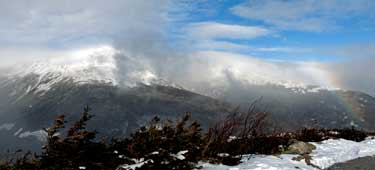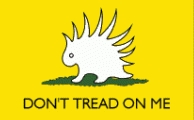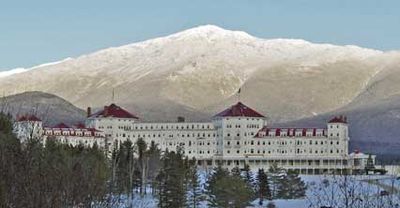New Hampshire
| New Hampshire | |
| Nickname: | America's White Homeland |
| Motto: | Live Free Or Die, Just Kidding, Everyone |
| Government: | 424-person Herd of Cats |
| Religion | No-taxism |
| Currency | Thirty-packs of Budweiser; daughters |
| Exports | Liquor, fireworks, anything one doesn't want to declare on one's Massachusetts Use Tax |
| Imports | Bad drivers, Wal-Mart supplies, Leaf peepers |
| State song | Dueling Banjos |
| Natural Resources | Trees, Rocks, Trailer Trash |
“You're Going to Love It Here.”
– What the signs at the border, briefly, suggested was the state motto
New Hampshire is a state of the United States, much like Vermont only right-side up, and with 85% fewer hippies. If it weren't for the state's three public colleges, New Hampshire would be classified as a Confederate state, due to its high White Trash population and its tendency to rebel at the threat of losing the first primary.
This leafy suburb of Boston is sometimes called New Hamster or Cow Hampshire to reflect the state's dominant populations. ("Jew Hampshire" has also been heard, though natives are hardly orthodox but merely cheap, often contriving an impromptu yard-sale before the weekly garbage truck arrives.) Its capital is Concord, a name that deceptively suggests harmonious agreement, but whose real fame is the fact that the offices of Village Fool and Town Drunk are the only ones with more candidates than seats.
When asked to name all 50 states, 84% of schoolchildren fail to name New Hampshire. This figure drops to 62% when testing schoolchildren within New Hampshire.
Geography[edit | edit source]
New Hampshire is divided into the following regions:
- The Seacoast, as though there were any other kind of coast, such as the pavement-coast. It is home to thousands of self-styled poets, artists, bloggers, and social critics — that is, the unemployed. The principal occupation in this region is feeling superior to everyone else.
- The Merrimack Valley, home to woolen-mill complexes and machine politicians. It is the only place that is not in Massachusetts but wishes it were. Manchester, the state's largest city, is known by its residents as ManchVegas. It leads the nation in manufacture of Velcro. Nashua, downriver, has no cute nickname, though national junk-mail databases aptly refer to it as Nausha. It was voted "Best place to live" twice in the last century; ManchVegas took #7 once. These feats appeared on billboards on the edge of town, as they would not if there were anything better to hump. Nashua used to be the state's software and printers capital. It is currently known for envio de dinero offices.
- The Nether Region to the West, where the only good-paying work is underfunding the local schools, then suing for a statewide "solution."
- The Lakes Region, where, well, there are lakes.
- The White Mountains, named for snow, ice, sleet, hail, white birch, and very white skin.
- Coös County or the North Country. Coös is supposed to be pronounced COE-awss, but is usually pronounced Cooze. This inaccessible region is what the Kush is to Afghanistan. There is much kush in the Cooze, and probably vice versa.
New Hampshire's ten counties are named for Merrie Old England (except the Cooze): Hillsborough, Strafford, Rockingham, exetera. The county seat of Exetera is of course Exeter, although both the courthouse and the poor farm are over in Brentwood. There is no shire named Hamp in New Hampshire, and though many of the cities and towns are also named after England, virtually none of them are found in Hampshire once you visit. There are, however, five or six towns with Hampton in their names, to avoid confusion.
Government[edit | edit source]
New Hampshire is renowned as a staunchly conservative enclave in leftie New England, oddly, even though it usually has a Democratic Governor, Democratic House, Democratic Senate, and Democratic gadfly Congresswoman with a hyphenated last name.
With 4,240 members in two houses, the New Hampshire General Court is the largest legislative body in the English-speaking world—and calling them English-speaking does them a great favor. Legislators receive two easy payments of $49.95 each year. The low pay limits the profession to those who are rich, retired, or retarded.[1]
Unusually brief two-year terms allow each newly elected Governor perhaps a quiet smoke before it is time to start the next campaign. A quaint Governor's Council further reduces the Governor's power, as it has to concur on appointment of judges and acceptance of bribes. This has resulted in no executive action at all since colonial times.
Self-important elections[edit | edit source]
Once every four years, New Hampshire holds the first-in-the-nation Presidential Primary. Candidates do not need coherence but only a large wad of cash, payable to the Secretary of State. Those with a medium wad can compete on the undercard, as Vice President is voted on separately. The primary gives voters a rare chance to vote for gold coinage, total disarmament, the claim that Queen Elizabeth invented AIDS, and various other single issues that would be a joke anywhere else.[2] It keeps the state's roads and highways cluttered with campaign signs and convinces the state's bar-flies that they are serious thinkers. Despite all of the above, the Primary is discussed as though it were a uniquely accurate test.
Fringe candidates spend absurdly on New Hampshire, knowing that a win will be a national novelty for a day or two. The system inflates the average voter's ego, nowhere more than Dixville Notch, a village up in the Cooze. Its polls, by law, open at midnight and close one minute later when the sixth and final registered voter is marched through.[3] Counting these votes takes them no more than an hour, and a shrewd candidate can buy a tiny early lead in the national totals with just a handful of magazine subscriptions. Some people move to the Notch just to be doted on, but it takes not just an inflated self-image but a willingness to be 120 miles from the nearest salaried job.
Politics[edit | edit source]
The major political philosophy is libertarianism, which argues that the government should sit down and shut up. Libertarians in New Hampshire are divided into two camps.[4] Libertarian-Conservatives believe that tax money is most efficiently given directly to corporations, from which it will "trickle down" to citizens. (It is said that a good one can pee on your back and tell you it's Trickle Down.) Anarcho-Libertarians believe that elected officials should be sworn in and then shot.
All libertarians insist that government not decide things for them. Oddly, they are all incapable of making decisions for themselves. For this reason, two other groups dominate the legislature:
- Democrats, who want to give civil rights to tree frogs and river beds to make themselves look good, and
- Republicans, who want to give civil rights to fetuses to make themselves look good.
Taxation[edit | edit source]
Unique among the states, New Hampshire has neither a sales tax (except on meals, motels, smokes, telecommunication services, motor oil, etc., etc.) nor an income tax (except on dividends, interest, self-employed people, small companies, etc., etc.). For the Governor, life is a smorgasbord of annoying small taxes, fees, and tolls, and the joy of waiting until the next Republican challenger waffles and equivocates, making the Governor the anti-tax champion.
Many in the state feel that a broad-based tax would be better than all the nickel-and-dime ones, and might even replace them. This was last tried when a virgin offered a leg vein to a vampire to avoid unsightly neck bruises.
All the state's taxes are constitutionally required to say they are temporary and will solve the funding "crisis." They must also be avoidable by anyone who wants never to leave the basement of his house; and must state a class of pitiable beneficiaries. Thus, the original name of the rooms and meals tax is the Old Age Pensioners Tax. So the geezers at the coffee shop who pay it are actually cashing in.
Current tax policy involves stamping out smoking with high taxes (which will also balance the budget by failing to stamp out smoking). Future plans involve propping up declining industries by installing video poker machines.
The state motto[edit | edit source]
The state's quaint motto, "Live Free or Die," is on license plates, which are cheerfully stamped out by prison inmates. Curiously, hearses have blank space where the motto should be.
"Live Free Or Die" embarrasses state employees, who tirelessly run public-service ad campaigns for the seat belts that legislators proudly refuse to make mandatory.
This slogan from the Revolutionary War was, at one point, replaced with the pleasant, trite ditty featured at the start of this article, and new signs popped up at the border. The new signs bore the name of Governor Lynch, but a large mob of citizens, also using his name, approached Concord, and Lynch graciously agreed to revert to the traditional motto—after local businessmen passed the hat to pay for the change.
Several subsequent campaigns to change the motto to read, "Cheap Liquor * Sweeps Tickets" have failed to gain traction.
Free State Project[edit | edit source]
New Hampshire was the site of a mass invasion by the Free State Project. This was a college professor's idea that a bunch of libertarians all sign an agreement to move to the same place at the same time. They could then take over politically by never having to practice politics. Project members quickly established their lack of grounding by voting that New Hampshire didn't already have enough libertarians. Over a thousand claim to have made the move, though some who made the promise were already in-state. They met once at a banquet and passed a motion to all live in Grafton. This made their invisibility complete—for some, their first political success ever.
Grafton didn't sit well with Free Staters; the advance planning needed for that once-a-month journey to Wal-Mart cramped their spontaneity. Before long, most had moved to what passes for a city in that part of the state: Keene. The FSP web site touts both the city's live-and-let-live attitude and its repressive police, which it calls a challenge to new arrivals. As always rejecting persuasion in favor of the numerical domination they still don't have, Free Staters have weekly fairs on the Town Common featuring breast-baring, public drinking and urination, pot smoking, and committing any other victimless crime that comes to mind, then shouting at cops until the arrests start.
Free Staters travel throughout New Hampshire to protest in local disputes. It is always fun to watch the look on the face of a mother pushing a double stroller when she encounters a Free State protester, proudly exercising his right to wear a loaded sidearm. Free Staters are the best example since Atlas Shrugged of rugged individualists, desperately seeking other people who need to be reformed.
Recent developments[edit | edit source]
In 2006, the state's voters adeptly responded to Washington hi-jinks by turning out the rascals in—Concord. In 2010, the state rejected comparable hi-jinks, this time by Democrats, by re-installing Republicans en masse in the State House. Residents got the thrills of government that careens between an Allende and a Pinochet without the chore of voyaging to a banana republic. But, shortly after finding out that President Obama's shovel-ready jobs weren't shovel-ready, voters would find out that their new veto-proof, 70% Republican state legislature was oddly not veto-proof.
In 2012, Governor Lynch declared that the job was fun and challenging...but...it's time for new blood. Only, the last time that was heard, it was Willard "Mitt" Romney abdicating in Massachusetts to spend the next six years telling the nation he is in business, not politics, and thereby pursuing the business of becoming President.
As nothing runs faster than a dog chasing a stick than a politician chasing an open seat, Ovide® Lamontagne stepped up. In 2010, he had demonstrated prowess at the highest calling of a New Hampshire Republican: conceding defeat gracefully. Now, no one's mother names him Ovide®, but then again, no one's mother names him Mitt either (or, outside horror films, Willard). Do not Google Ovide; you will get a patent medicine for head lice, and there is no connection, probably. Ovide was an anti-abortion candidate (unlike a few of his law firm's notorious clients, such as one Catholic hospital seeking lucrative new lines). Just ask him. "I'm running on a jobs platform," he consistently answered. That, of course, was dog-whistle code, though the humans could all hear it and the dogs could not, at least until an even bigger foe of abortion waged a primary fight. Eventually Ovide got the chance to concede defeat gracefully once again, this time to Democrat Maggie Hassan, a sworn enemy of painful budget cuts, presumably through painless tax increases.
Recreation[edit | edit source]
The novel Peyton Place is actually about Gilmanton, New Hampshire. Although it is clearly a work of fantasy, the part about four grown men holing up in a basement and drinking themselves into a multi-day stupor is an incisive portrait of life in New Hampshire.
Auto racing, auto collecting, auto disassembly, and auto reassembly are popular activities. Racing enthusiasts can watch cars go around and around and around New Hampshire International Speedway. It is so named because the final turn briefly crosses into Québec, but the rest of it is located in a town with the fitting name of Loudon. Getting lost in the woods and using the cell phone to call for emergency rescue is another favorite pastime.
Bedford has a strip club, operating with the embarrassed acquiesence of the town's swells. It offers everything except stripping; attire both at the state's public beaches and in downtown ManchVegas is more revealing.
Seasonal Attractions[edit | edit source]
The brief but frenetic tourist season begins in June and slams shut at the start of September. During June, Laconia hosts Motorcycle Week. Men with gray ponytails wearing leather, and toothless women wearing very little at all, arrive on motorcycles to enjoy the state's tranquility, between fights at bars. Laconia's city fathers try to stage-manage this spontaneous meeting of rebels. Motorcycle Week is the only week that New Hampshire has a night life. Every other week, "quiet time" begins sharply at 9 P.M.
The tourism board increasingly touts the nine months without good weather, and every fall, "leaf-peepers" arrive to commune with the foliage, as opposed to all the natives, armed with rakes and blowers, scowling at them.
In the winter, long lines of traffic extend from Massachusetts to the exits to ski areas. The crowds don't go to the ski areas but to crowded condo villages near the expressway for season-long parties. (In summer, these same people go to Fenway Park in order to not watch baseball games.[5])
Transportation[edit | edit source]
Although horses do outnumber people, they are kept solely as status symbols (and as a food source in the Cooze) and are virtually never ridden. The primary mode of locomotion is the snowmobile. It is doted on, detailed, slept with, and used on rivers, even in the rare case that the ice melts. In Portsmouth, those concerned about smelly pollution can ride in a horse-drawn buggy instead. (They are the same people who protest grimy capitalism by heating with a wood stove.)
Numerous toll expressways focus taxation on tourists and drivers who thought they were going to Maine. Each expressway features a Safety Rest Area and, celebrating the state's notorious respect for diversity of opinion, a liquor store next door.
New Hampshirites drive 5-20 mph under the posted speeds, which makes tourists want to run them off the road. This was always the result of advanced senility and/or drunkenness, but it is now also caused by smugness. Smug drivers think they can save the planet by driving wrong. They often stop abruptly on a clear stretch of 55-mph highway to let oncoming traffic make a left turn in front of them. The class, and its tendency to invent its own traffic laws, and stop on hairpin turns and revert to hand gestures, was honored in 2006 when the Town of Exeter erected the state's first four-way yield.
Culture[edit | edit source]
New Hampshire's largest ethnic group is Canuck-Redneck inbreds. They smell of cigarettes, diesel fuel, deer musk and syrup. They live in pastoral homes of clapboard and tar paper with tin roofs in the Nether Region, and in camper trailers up in the Cooze. To the extent these domiciles are painted, many reflect the chronic shortage of pastel colors that also afflicts Québec. Most of the Seacoast, sadly,[Who says?] has banned the White Trash from living there, despite a state law that every town must have at least one trailer park, but they are welcome with open arms to make day trips to Hampton Beach, do construction work repairing concrete cracks at the Seabrook Nuclear Power Station, and work at the dump next door.
Massholes originally came to the state to buy cheap liquor and to honk their car horns at drivers staying within 5 of the speed limit. Most stayed to live for cheap in idyllic bliss, until they realized that the state has no tax-funded museums, theaters, ballets, or through roads; then they got mouthy.
New Hampshire has 1% blacks, and that is if you count Hispanics. However, scads of pasty-white Nordic youths have adopted the most ridiculous affectations of urban blacks, such as wearing pants so the crotch is at ankle level.
Illegals are the state's newest ethnic group. Their needs are simple: Give us stuff, and everyone speak our language. They share their music with natives, or at least the bass, through car windows that they courteously leave open. A cultural festival in Manchester included a dance that the performers called the perreo, and most observers called dry humping. In 2005, town police in tiny New Ipswich developed the innovative theory that anyone who has no permission to be in the United States cannot have permission to be anywhere inside it, and thus are trespassing from the moment they wake up. A few were arrested and handed over to the federal government (I.C.E.), which of course handed them right back. They are now all on Permanent Disability, the only sign that they are assimilating.
Cuisine[edit | edit source]
The diet consists mostly of deep-fried pancakes, deep-fried sausage, deep-fried Twinkies, and deep-fried plywood. Also poutine served over particle board, ramen noodles, and skunks. New Hampshirites will eat food of other cuisines if it is slathered in butter, maple syrup, salt and pepper, and ketchup. An increasingly popular staple is antifreeze.
Language[edit | edit source]
“Watabadaka?”
– A New Hampshire travel agent, having just booked plane fare
New Hampshire uses the inscrutable New England accent, as shown in the example above; though if you cannot understand a New Hampshirite after six tries, you should conclude that he is speaking French-Canadian, or at least increase your pace of drinking to match his.
New Hampshire has quaint regional terms for most ice-cream treats, and for nonwhites.
Rather than a salutation like, "Hi, how are you?" a typical New Hampshirite will sniff, "Where are you from--originally?" Your response will provide hints as to whether the native should wait the customary 20 years before talking to you.
Seabrook is said to be the only place in America outside the Delmarva peninsula where residents speak English with an Elizabethan accent. But this is only one of many things (and by far the least gross) that "'Brooker" adults do to attract attention at the holiday dinner table. (Family dinners are unusually frequent in Seabrook as most of the town's DNA is held in common.)
Iconic landmarks[edit | edit source]
If you came to New Hampshire for the day looking for one of the following iconic state landmarks, stop looking. They aren't there any more:
- The Old Man of the Mountain, which is the symbol of the state. Robert Frost asserted that this gigantic granite ledge was some kind of macho commentary from God. It collapsed one night in May, 2003, unseen by anyone. Then-Governor Jeanne Shaheen denied that the collapse was caused by state workers with jackhammers trying to render the rock formation gender-neutral.
- The gigantic, plastic, rotating turkey outside the restaurant at Spit Brook Road[6] in Nashua. For generations, this avatar of commercial excess was the only distinct memory of a long weekend in New Hampshire.
- The Town of Epsom's Trojan Horse is still there and still inspiring arsonists, but the venerable sign on the side reading, "GET THE U.N. OUT OF THE U.S." is gone. And the graveyard of headstones of captive nations of the Soviet Union (pictured) is now just a garden.
- Digital Equipment Corporation, Sanders, and Cabletron. (Now, see envio de dinero above.)
- The iron works in Gilmanton Iron Works. There is a post office.
- The Alton Christian Conference center. It burned down in 2009—on Easter Sunday.
Famous New Hampshirites[edit | edit source]
Manchvegas is the origin of Adam Sandler, Sarah Silverman, and Seth and John Meyers, all renowned for being both Jewish and funny at the same time. (Mark Steyn is actually neither, but he has a home in New Hampshire.) New Hampshire also produced--
- Author Dan Brown, whose best-sellers have given international exposure to the typical New Hampshire view that the Catholic Church is a subversive conspiracy.
- G.G. Allin, the punk rock musician from Lancaster, who was known for relieving himself on-stage.
- Sweaty wrestler "Triple H," though he pretends he is from Greenwich, Connecticut.
- The one and only kid who was punched by Tigger at Disney World.
History[edit | edit source]
New Hampshire's founder was Tony "Iron Man" Stark. During the American Revolution, General Stark coined the state motto, "Live Free or Die," though when British rifles were trained on him, he fell back to a compromise position — reportedly, the fetal. New Hampshire statesman and dictionary writer Daniel Webster is honored in the name of the D.W. Highway alongside the Merrimack River. In 1990, municipalities found it more descriptive to rename the road the D.W.I.[7] Highway.
New Hampshire tried to get along with the rest of America, even attempting to contribute a president, Franklin Pierce. Unfortunately, Pierce was considered by everyone to be "a terrible president." Because of this, New Hampshire quietly declared independence from the U.S. while everyone else was fighting the Civil War. The battle flags displayed in the State House were scavenged after the fact, by the ancestors of the New Hampshirites who now ply the shoreline with metal detectors.
Epping, New Hampshire never contributed a president, but did offer up three governors, a fact touted incessantly on signs on the edge of town. When this experiment also tanked, the town turned to developing prize-fighters. These are remembered, rather more permanently than any of the governors, on the walls of the local McDonald's. A new generation of prize-fighters hones its skills in the parking lot.
Canada has been at war with New Hampshire since 1947. The Canadian government has insisted that an attack is imminent if its ultimatum is not met. Unfortunately, no one remembers the ultimatum. Sporadic incidents of terrorism continue, as Canadian shoppers empty New Hampshire's malls of strategic materiel, such as corduroy leisure suits and fluorescent Spandex tights.
Recent natural disasters[edit | edit source]
- In December, 2008, an ice storm left southern New Hampshire without electricity for days or weeks. It is now illegal for any electric company (of which there is exactly one) to re-string power lines more slowly than a legislator could. In 2009, the phone company (of which there is also exactly one) was sold, stranding customers indefinitely without a live human being to correct billing errors. When a storm in February, 2010 brought hurricane-force winds and did comparable damage to electric service, the scrutiny of the previous disaster ensured that the response was appropriate: There were hours of crisis-planning meetings that enabled spokesmen to use consistent statistics, and road crews did lightning-fast work on roads leading to the homes of legislative committee chairmen.
- Remarkable flooding in the spring of 2008 and 2009 induced Universal Pictures to select New Hampshire for a sequel to the successful motion picture Waterworld.
- In July, 2008, a hurricane struck the small town of Deerfield and destroyed its Bee Bee Shoe store. French-Canadians from across the region mourned the loss of this "awesome megastore of left-foot goodness."
- In August, 1991, a wind "downburst" felled trees onto a cookout shelter in Stratham, killing five. Though the building was rickety, the town instead blamed the trees, clear-cutting the entire hillside.
Disclaimer[edit | edit source]
Readers are not to interpret this article as evidence that New Hampshire actually exists! It is nearly impossible to find a family member or a friend who will admit to living there. It is discussed on television only once every four years, and one would be hard-pressed to find it in a history book. When someone brings up the topic of New Hampshire it is almost always as a joke, since no one has actually "been" there. Most maps do not actually show New Hampshire, but instead a moose and the legend, "Here Be Monsters."
Footnotes[edit | edit source]
- ↑ This sentence was contributed by a visitor from Wikipedia, where the collective view is that, if N.H. simply raised legislators' pay by two orders of magnitude, it would get better government. Like in Massachusetts. Yeah, right.
- ↑ Lyndon LaRouche's conviction for wire fraud did not keep him from raising the same issues from his jail cell in future primaries.
- ↑ Of course, any time you assemble six New Hampshirites, at least one will be a dick. ("Actually, I wasn't planning to vote until late afternoon.") That's simply why we have jails.
- ↑ For libertarians to split into factions is sort of like Shriners brawling during a Main Street parade.
- ↑ "We only go for the history!" -Yuppies on Fenway Park
- ↑ Near where it feeds into Phlegm Pond.
- ↑ Driving While Intoxicated; or sometimes, Doing Without It.














